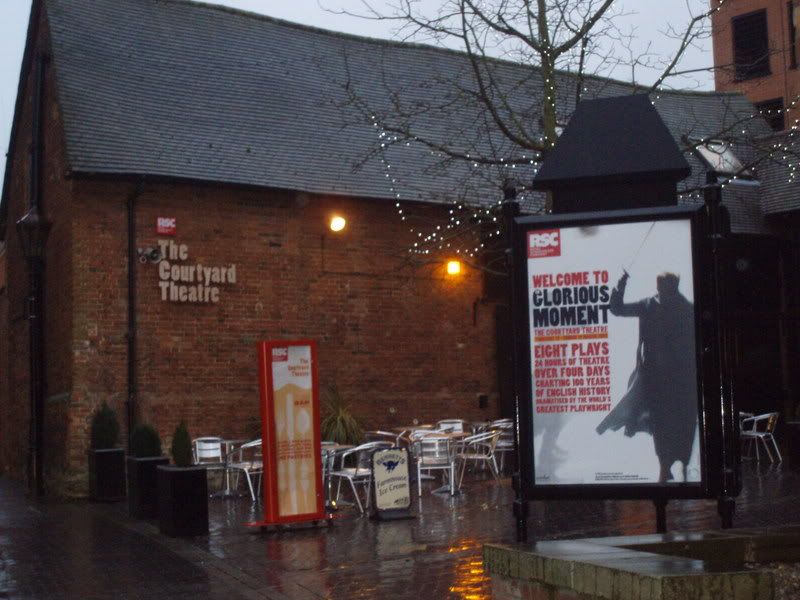Risen from the rubble
My first visit to the ‘new’ Royal Shakespeare Theatre was always going to be a bit of an event. It’s been getting on for 5 years since I’ve been to a theatre on the Waterside site, the last visit to the old theatre being Merry Wives the Musical in December 2006.
I remember the feeling of shock when I went down for The Glorious Moment and saw the shell of the theatre for the first time, and then gradually seeing the new theatre take place over subsequent visits.
The building has been open for a few months now, but the first productions specifically for the new auditorium have opened fairly recently.
 As a building, it’s different, but the same. A place of mixed emotions, it feels strange to step back into what has always been the foyer, and is now the stalls bar. So much more space, now they’re not trying to cram everything onto that small area. The old fountain and the marble staircase up to the circle are back in place, but the circle bar is now accessible to all, not just to those with a circle ticket (and not, therefore, somewhere I’ve visited with much frequency). A new link corridor between the entrance to the RST and the Swan now provides shop space.
As a building, it’s different, but the same. A place of mixed emotions, it feels strange to step back into what has always been the foyer, and is now the stalls bar. So much more space, now they’re not trying to cram everything onto that small area. The old fountain and the marble staircase up to the circle are back in place, but the circle bar is now accessible to all, not just to those with a circle ticket (and not, therefore, somewhere I’ve visited with much frequency). A new link corridor between the entrance to the RST and the Swan now provides shop space.All the art deco features of the original building have been retained, the floor of the old stage has been re-laid in the public areas (and yes, I did find that thrilling), and some of the features in the old structure have been left exposed to show the history of the building. I can understand this, but am not sure I like it.
 Through the doors which used to be the entrance to the stalls runs a semi-circular brick wall, the back of the new auditorium, with quick change areas for actors tucked away in alcoves. Higher up, bridges link across to the upper levels.
Through the doors which used to be the entrance to the stalls runs a semi-circular brick wall, the back of the new auditorium, with quick change areas for actors tucked away in alcoves. Higher up, bridges link across to the upper levels.Inside the auditorium, it looks and feels like the Courtyard Theatre, which is slightly odd, as, if you know that theatre well, you feel like you’ve suddenly entered a different building, and one that seems very familiar. That theatre was always meant to be temporary, this isn’t, and therefore has some extra touches which make it feel finished off. None of the seats look to be that far way from the stage, and to have good sightlines.
Of course it’s the bits that the audience don’t see which have changed the most, the backstage areas, the facilities for wardrobe, technical, wigs make-up, dressing rooms . A rabbit warren of corridors that it must take actors a while to get used to. There’s depth below the stage that didn’t exist before. In the old theatre, there was so little space between the back walls of the RST and the Swan that actors appearing in each tended to bump into each other, now, it feels spacious.
Labels: RSC, RST, shakespeare, stratford, theatre











